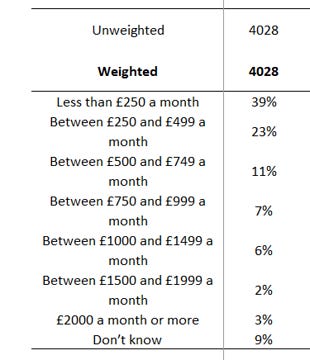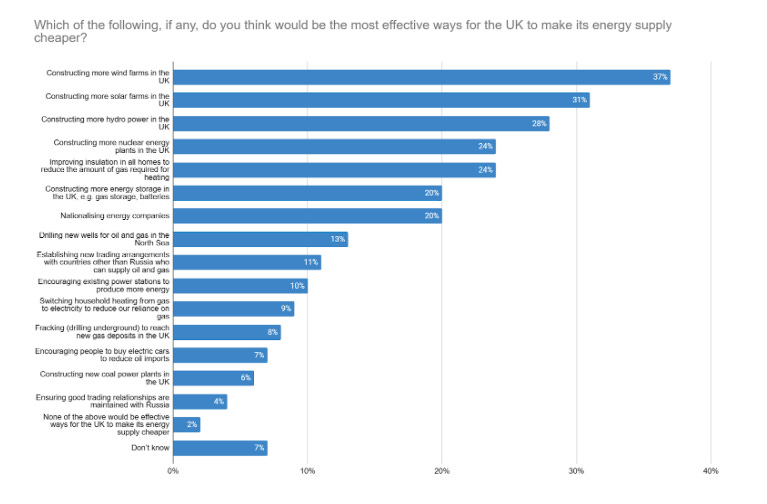EE#29 Can Labour afford to reduce household bills?
Energy bills needs to be a consumer focused issue not a climate one
Co-authored with my ace colleague, Amy Norman.
Tackling the cost of living brings together the party's big radical idea of decarbonising energy with the everyday reality of voters’ bills. But bills are currently going up. Ofgem just raised the price cap to £1,714 - up £150 for the typical household. They’ll probably go up again in January.
Cost of living still comes up in nearly all of our focus groups. Two in five adults say they have less than £250 leftover every month after rent and bills. But higher bills aren’t just a very real human issue. Rising costs will come hard at the Labour government.
Labour uses cost of living to frame its energy policy because it unites Labour’s voters, and as importantly it unites Labour’s internal coalition. Decarbonisation plus bills is a message you can take to Green seats and in Reform ones.


But if bills go up, whilst decarbonisation continues that coalition gets a bit fragile. The left, and campaigners, will want Labour to do something bold, radical and expensive. They will criticise Labour for its focus on fiscal sustainability. The right meanwhile will paint Labour’s energy policy as a waste of money, hurting households. The criticism government received from left and right over the Winter Fuel Payments was an early warning sign.
The government needs to diffuse this bills bomb. It’s risky, but getting ahead of it can put Labour on the front foot, and give it a defendable position until it can do more. What options does it have?
First, we need to define the target. What do you want to be able to say to the electorate now and in 2024? Are we aiming for a specific sum of the average bill, meaning everyone benefits at least somewhat? Or do we want to focus on the most vulnerable? Being cynical, political pressure is mostly likely to come from lower-middle-income households, a group more fickle when it comes to voting. Any intervention needs to help them.
Changing generation
Labour’s argument that building lots more renewables increases energy security is bang on. That security contributes to lower bills. Renewable contracts are more predictable. We won’t be exposed to price surges like we saw in 2022 and may see again with the febrile situation in Iran. The public is also convinced greener = cheaper, but arguing a counter-factual of bills rising by more is a challenge.
Supply chain costs have risen for some renewable technologies. They’re still a great deal, just not as cheap as when interest rates were 0%. And whilst you build out renewables gas still plays a role, and this expensive marginal use often sets the electricity price. The more clean storage we have the less that happens. But longer-term clean storage like pumped hydro is very expensive and we have traditionally paid for things like that through bills.
Labour’s Local Power Plan wants more small-scale generation locally, particularly for the fuel poor. A solar array on a council estate or wind turbine in an isolated community could reduce their bills. Labour could take a message to the electorate of fairness, and point to case studies, but it’s not the same as everyone benefitting.
Playing with markets
The Review of Energy Markets Arrangements (REMA) is sat on a dusty shelf in a field of 10-foot-high grass. Sparing you the technicalities, but essentially this was the previous government’s incredibly slow, broad set of consultations on how to run a cost-effective renewables-based system. It explored ideas like whether you could have a separate wholesale price for renewables, or how to better structure the capacity market to stop gas setting prices.
The problem with REMA is that changing the potential investment proposition of renewables whilst trying to build enough to reach 2030 is a nightmare. It makes the private sector wobbly, and it also just sucks a vast amount of civil service time needed elsewhere. There’s lots of hope in here, but it might be it needs to wait until you have a decarbonised system and then work out how to run it.
Bill changes
That leaves us directly acting on bills.
Everyone and their dog wants the way bills are costed to change. Specifically, campaigners and businesses want policy costs (social and renewable funding schemes), taking off electricity and either put onto gas or paid for through general taxation.
This is not cheap. Moving all costs into general taxation would require £5bn a year. Campaigners are going to want Rachel Reeves to do this in one go. Seeing as Labour has just cut winter fuel payments to save less than £2bn, this isn’t going to happen. But doing nothing isn’t an option either.
In keeping with Reeves’ rhetoric Labour needs to announce some benefits now, but signal progressive improvements over the parliament. It can continue to blame both the rising bills, and the lack of ability to act boldly on its inheritance, but crucially government can recognise that action needs to be taken.
Labour should look to move ECO and the Great British Insulation Scheme into general taxation this year. A clever friend reminded us that doing this at pace (<6 weeks) HMT isn’t going to administer the scheme, merely put in place financial support to reduce the unit energy rate by the same amount - Energy Price Guarantee style. Rebalancing ECO and GBIS would, according to EnergyUK, cost about £1.5bn and save households an average of £58, 40% of the rise. That is not enough on its own. Labour also has a manifesto commitment to upgrade 5mil homes through £6.6bn additional funding. Confirming the grant level and eligibility of the Energy Efficiency Grant, along with relaxing the minimum requirements of ECO4 will allow more money to get to households faster. It costs more to identity households than they get in upgrades.They should definitely announce updated minimum efficiency standards for the private rented sector at the same time.

Rebalancing all policy costs from electricity to general taxation should be the aim of a progressive government. It is a fairer way to distribute costs and will help support electrification. This should be stated as the government's aim by the end of the parliament, with a promise to publish a roadmap on how that can be achieved. Funding legacy renewables programmes like RO and FIT will require £3bn a year until those schemes start to wind down in 2027.
This roadmap provides a chance to announce a host of other policies that will support bill reductions. Much of this is set out in Amy’s report Upgrade but includes: a sprint to ensure government can FINALLY match socioeconomic data and fuel poverty to actually identify vulnerable households. Ofgem could launch Labour’s promised manifesto consultation on standing charge reform at the same time.
All these reforms will undoubtedly support climate. But now is not the time to frame it as such. We can point out afterwards that this has helped electrification, and build on any success. Labour needs to own this as a tangible consumer issue, not a clean energy one, and one which puts Rachel Reeves on the front foot on bills, balancing her Conservative inheritance with action.
Thanks to smart people like Ruairidh Macintosh and others for helpful comments.





